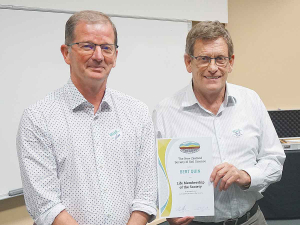Geopolitical shifts drive fertiliser market volatility – Ravensdown
According to Ravensdown's most recent Market Outlook report, a combination of geopolitical movements and volatile market responses are impacting the global fertiliser landscape.
 Dr Bert Quin (right) receiving his Life Membership of the NZ Soil Science Society late last year, for “Distinguished Service to Soil Science”.
Dr Bert Quin (right) receiving his Life Membership of the NZ Soil Science Society late last year, for “Distinguished Service to Soil Science”.
Quinfert owner, Bert Quin says his autumn fertiliser sales are nearly double last year’s.
This is despite farmer difficulties with the extended drought and getting their stock processed, not to mention complications arising from COVID-19.
He claims this a clear sign that more and more farmers are seeing through the “disinformation campaign” about Quinfert’s Algerian RPR, touted as an environmentally protective fertiliser<.
“It has longed been ranked one of the very best RPR’s internationally, in all the internationally used tests, and even more importantly, in field trials”, Quin says.
“Putting the hard facts forward in regular print advertising has had a large role to play in this”.
Quin believes farmers are becoming increasingly cynical about what they are being told by their regular supplier.
“They have been told for decades that soluble P doesn’t get lost in significant amounts to the environment in runoff or leaching. Now, with Quinfert appearing on the scene with its true RPR, farmers are being offered a drilling super type product as the saviour for the environment because it has far lower P losses than superphosphate,” he adds.
“Farmers were also told that high-performance RPR had become very hard to get.”
But Quin says that Algerian RPR had been available all the time and was offered to the industry.
The 5+ A Day Charitable Trust has launched a collection of affordable recipes designed to turn everyday vegetables into seasonal stars.
Jane Mellsopp has been confirmed as the new Government Appointee to the New Zealand Meat Board (NZMB).
To celebrate the tenth anniversary of its annual Good Deeds competition, Rabobank will give away $100,000 to improve rural community hubs, schools, clubrooms, and marae across New Zealand.
Agricultural and veterinary product supplier Shoof International has appointed Michaela Dumper as its new chief executive.
Federated Farmers is celebrating following the Government's announcement that young farmers will be able to use their KiwiSaver funds to buy their first home or farm.
The Meat Industry Association of New Zealand (MIA) today announced that Chief Executive Officer Sirma Karapeeva has resigned from the role.